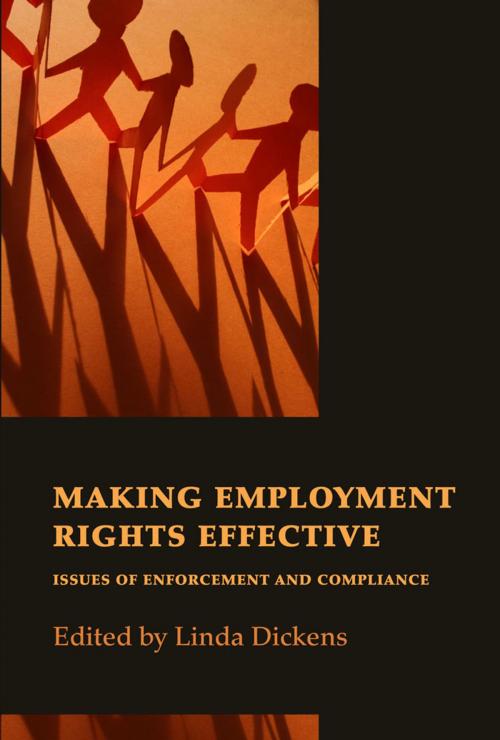Making Employment Rights Effective
Issues of Enforcement and Compliance
Nonfiction, Reference & Language, Law, Labour & Employment| Author: | ISBN: | 9781782250081 | |
| Publisher: | Bloomsbury Publishing | Publication: | October 2, 2012 |
| Imprint: | Hart Publishing | Language: | English |
| Author: | |
| ISBN: | 9781782250081 |
| Publisher: | Bloomsbury Publishing |
| Publication: | October 2, 2012 |
| Imprint: | Hart Publishing |
| Language: | English |
There has been an enormous expansion of individual employment rights in Britain but their practical impact in terms of delivering fairer workplaces can be questioned. Taking as its starting point the widespread acknowledgement of problems with the major enforcement mechanism, the Employment Tribunals, this collection brings together experts from law, sociology and employment relations to explore a range of alternative regulatory and non-regulatory approaches to enforcement and to securing compliance and to consider factors affecting variation in the extent to which legal rights have meaning and impact at the workplace. Thus this book addresses issues key to contemporary policy and academic debate.
Chapters discuss the growth in employment rights and their enforcement mechanisms (Gillian Morris), problems with the employment tribunal system and the current and potential role of alternative dispute resolution (Linda Dickens); reflect on the long experience of enforcement of equality rights (Bob Hepple) and agency enforcement of health and safety legislation under the 'better regulation' agenda (Steve Tombs and David Whyte); evaluate the potential of various 'reflexive law' mechanisms, including corporate governance (Simon Deakin, Colm McLaughlin and Dominic Chai), and of procurement (Christopher McCrudden) as strategies for delivering fairness at the workplace. Factors influencing how statutory rights shape workplace practice are illuminated further in chapters on trade unions and individual legal rights (Trevor Colling), the management of employment rights (John Purcell) and regulation and small firms (Paul Edwards).The opening chapter (Dickens) makes the case for addressing issues of enforcement and compliance in terms of adverse treatment at work, while the final chapter (Dickens) considers why successive governments have been reluctant to act and outlines steps which might be taken - were there sufficient political will to do so - to help make employment rights effective in promoting fairer workplaces.
There has been an enormous expansion of individual employment rights in Britain but their practical impact in terms of delivering fairer workplaces can be questioned. Taking as its starting point the widespread acknowledgement of problems with the major enforcement mechanism, the Employment Tribunals, this collection brings together experts from law, sociology and employment relations to explore a range of alternative regulatory and non-regulatory approaches to enforcement and to securing compliance and to consider factors affecting variation in the extent to which legal rights have meaning and impact at the workplace. Thus this book addresses issues key to contemporary policy and academic debate.
Chapters discuss the growth in employment rights and their enforcement mechanisms (Gillian Morris), problems with the employment tribunal system and the current and potential role of alternative dispute resolution (Linda Dickens); reflect on the long experience of enforcement of equality rights (Bob Hepple) and agency enforcement of health and safety legislation under the 'better regulation' agenda (Steve Tombs and David Whyte); evaluate the potential of various 'reflexive law' mechanisms, including corporate governance (Simon Deakin, Colm McLaughlin and Dominic Chai), and of procurement (Christopher McCrudden) as strategies for delivering fairness at the workplace. Factors influencing how statutory rights shape workplace practice are illuminated further in chapters on trade unions and individual legal rights (Trevor Colling), the management of employment rights (John Purcell) and regulation and small firms (Paul Edwards).The opening chapter (Dickens) makes the case for addressing issues of enforcement and compliance in terms of adverse treatment at work, while the final chapter (Dickens) considers why successive governments have been reluctant to act and outlines steps which might be taken - were there sufficient political will to do so - to help make employment rights effective in promoting fairer workplaces.















